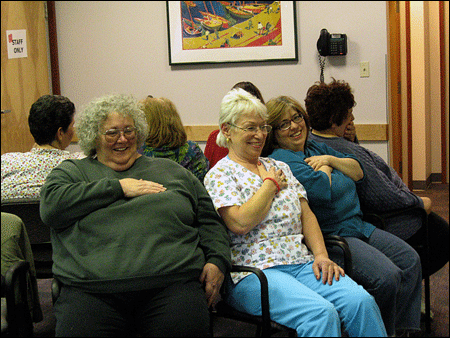Advertisement
Laughter Clubs: Why Cracking Up Is Good for You
Resume
With all the bad news these days, it can be tough to find something to laugh about. How about the traffic you're sitting in? Or your bank statement? Not so funny? Well, some people are howling at those things in laughter clubs.
The Arlington Laughter Club makes its own laugh track twice a month at the Church of our Savior. But members don't arrive hooting. First they warm up by introducing themselves and sharing a little something that's got them down: Bounced checks, anxiety, global warming. The mere mention of these troubles causes the entire room to erupt.
One of the most powerful cackles belongs to an expert: licensed psychologist Lynn Caesar. She founded the club five years ago and guides the group through a series of exercises designed to trigger intense, therapeutic bursts.
During "credit card laughter," more than a dozen people wander around the room pretending to open their credit card statements. When they show them to the others, they crack up hysterically.
There's also "bad hair day laughter," and "silent laughter."
But none of the people are laughing at anything that's particularly funny. And that's the point. Caesar says our bodies release a wash of beneficial chemicals when we laugh, the harder the better. She says it reduces stress, boosts our immune systems and mellows us out — even when we fake it.
"The part of our brain, the left pre-frontal lobe of our brain that's responsible for positive emotions, is activated, " she explains, "so you can bring your tired, angry, sad, painful body to a laughter club and joy will follow." The concept is very exciting for a psychologist.
But for some, "fake" delirium can be a turn off. 62-year-old Katherine Nunnelly lives in Boston and says while she's a believer now, she wasn't when she first showed up seven months ago. Nunnelly was having trouble sleeping, but after coming to a laughter club, she says she slept like a baby. "Hmm, there must be something to this," she mused.
Others say laughing riotously helps them cope with everything from physical pain to losing a loved one. Arlington real-estate broker Amy Tinge says it can be hard though, because if you burst into laughter at unexpected times, people don't understand. "You're not being silly," Tinge says. "You're just being relaxed. I drive around in my car a lot and people cut me off. My first reaction is (laughs), you just cut me off, you idiot! But it gets into your body and that's an amazing thing."
The healing power of laughter has been researched a fair bit. One of its biggest proponents was Norman Cousins, author of the best-selling book "Anatomy of an Illness." Cousins, a former editor-in-chief of the Saturday Review in New York, died in 1990, but he was given what seemed like a death sentence 25 years earlier when he was diagnosed with a degenerative spine disease.
Cousins checked into not a hospital, but a hotel, set up a movie projector, and proceeded to self-administer copious doses of Marx Brothers movies.
Cousin's symptoms receded and he went on to research laughter's therapeutic value, which fueled a field known as psychoneuroimmunology. Some people question whether Cousins actually laughed himself back to health, but medical professionals today are giving laughter a shot with their own patients.
Nurse Donna Peltier-Sax is one of them. She's project director for the Happy Heart Program run by Massachusetts General Hospital in Revere. Peltier-Sax works with women at risk for cardiac disease. After going to the Arlington Laughter Club, Peltier-Sax got herself certified to teach laughter yoga at the Revere clinic.
One of her students, Lennie Lyons, says at first she thought it was bizarre, "but after doing it, it does lower your blood pressure, and you just feel better."
56-year-old Anita Petricone of Winthrop is trying it out for the first time. "I am probably, by nature, a very irritable, short-tempered person," she says. Even so, Petricone is trying to be optimistic about guffawing on cue, because she believes you can't force a laugh.
In the end Petricone wasn't able to yuck it up during class.
What about you? Lynn Caesar recommends trying this simple, "laughing alone" exercise: If you're having a cup of tea and you have a tea bag, as you're dipping your tea bag in and out, you just start laughing. And laughing. Harder. Now laugh some more.
Do that, Caesar says, and you won't need a laugh track because you can always supply your own.
This program aired on June 12, 2009.
